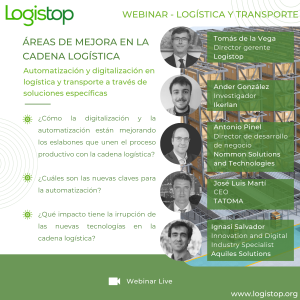- The ROS system has evolved into a mature development environment to speed up the development of control systems for robotics.
- Information, analysis and decision support tools are key factors for mobility planning and management.
- How can we apply the latest technologies in information management and real-time machine learning?
- How can we optimise our warehouses and routes to take into account all the factors involved in the process?
In the Logistop Webinar “Areas for improvement in the logistics chain. Automation and digitalisation in logistics and transport through specific solutions” we showed attendees, through specific solutions, how digitalisation and automation are improving the links between the production process and the logistics chain and how this is efficiently integrated into last-mile delivery.
For this, we have counted with the participation of Ander González, researcher, Ikerlan, Antonio Pinel, Business Development Director, Nommon Solutions and Technologies, José Luis Martí, CEO, TATOMA, Ignasi Salvador, Innovation and Digital Industry Specialist, Aquiles Solutions, and with the presentation and moderation of Tomás de la Vega, Managing Director, Logistop.

New keys to automation: ROS (Robot Operating System)
In his speech, Ander González explained and detailed the benefits and possibilities when using the ROS system (Robot Operating System) to integrate control algorithms, as well as its practical application with a series of use cases that Ikerlan is developing. Reduction of development time, creation of software independent of the final hardware and integration of the ROS system with third-party libraries in a standardised way within a common framework are some of the benefits that Ander highlights of the implementation of a ROS system.
He also analysed how the advances and evolution that have taken place in recent years have turned ROS into a mature development environment, generating, through ROS2, a more robust version that allows us to provide existing systems with functionalities that were not originally supported, reduce dependencies on specific hardware or suppliers and integrate different and new functionalities in an agile way.
“The implementation of a ROS system allows us, among other benefits, to reduce development time, create software that is independent of the final hardware and integrate the ROS system with third-party libraries in a standardised way”
Ander González, researcher, Ikerlan
Data-driven models for the mobility of the future
For his part, Antonio Pinel focused his speech on data-based models for the mobility of the future, explaining how we can use technologies for specific logistical needs and problems.
For this, Antonio based his presentation on three use cases that Nommon has developed or is developing: 1) access to the port of Barcelona, identifying its main access routes and dispersion in the network under study; 2) movement of heavy vehicles in Guipuzcoa, calculating origin-destination matrices of heavy goods vehicles in the province of Gipuzkoa with route information; and 3) impact of e-commerce on urban mobility, by analysing the impact of e-commerce during the pandemic on mobility in Bogota and Buenos Aires.
“COVID has increased the need for the development and use of information, analysis and decision support tools for mobility planning and management”
Antonio Pinel, Business Development Manager, Nommon Solutions and Technologies
Last mile logistics solutions with special electric vehicles and Innovation in hydrogen vehicles
José Luis Martí then focused on the analysis of last mile logistics solutions with special electric vehicles and innovation in hydrogen vehicles. To do so, he highlighted the importance of defining the concept of the last mile, as different solutions may be needed if we consider, for example, a radius of 2 km or another of 50 km.
Taking into account the possibilities offered by the latest technologies in information management and automatic learning in real time, José Luis explained to the attendees how they have developed a last mile service based on an approved container that meets a series of necessary technical characteristics, a special electric vehicle designed for the city, qualified personnel that allows a greater guarantee of success, as well as the development of an app and a Marketplace that carry out online tracking in real time.
“Defining the concept of the last mile is essential in determining and implementing the best logistics solutions”
José Luis Martí, CEO, TATOMA
Optimising pallet and lorry loading: the missing link between the warehouse and the routes
Finally, Ignasi Salvador explained to the attendees what happens at the point in the chain between what happens in the warehouses and what happens on the transport routes, for which it is essential to have an overview of the entire chain. The critical point, as Ignasi commented, lies in determining and clarifying who decides how the goods should be organised in the lorry and the criteria to be followed when making these decisions.
He also pointed out that the opportunity lies in optimising the entire configuration by resolving a series of questions such as which elements are placed on a certain pallet and which on another, determining whether the load will be stable at all times along the route or how it will vary, among other aspects to be taken into consideration.
“Is it possible to foresee all these aspects that can affect route and warehouse optimisation before starting work? The answer is yes. When carrying out these optimisations, it is necessary to do so completely and, although it sounds complex, it is a problem that can be solved.”
Ignasi Salvador, Innovation and Digital Industry Specialist, Aquiles Solutions
About Logistop
Logistop is the benchmark workspace for collective innovation through the realisation of projects hand in hand with our members. Transforming the entire supply chain into a more efficient and sustainable one. All this with the aim of articulating and carrying out innovation projects among the members, without excluding the possibility of collaborating with or receiving support from certain organisations outside Logistop.


